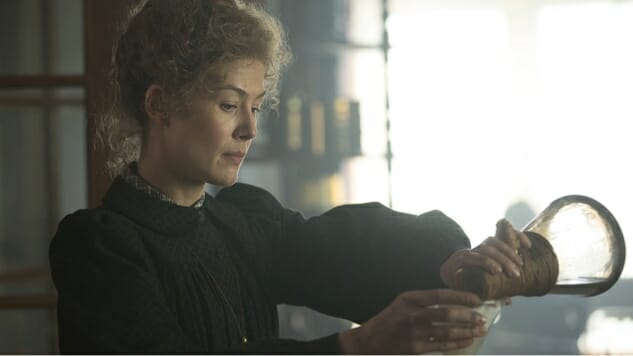Radioactive
(2019 Toronto International Film Festival Review)

The word Radioactive triggers immense fear in many. When exposed to the human body, it weakens DNA. Given enough time, it can cause cells to mutate and become cancerous. The universe contains a multitude of ironies, not the least of which is that the same radium can also help target and eliminate cancer in the human body. In her latest film, director Marjane Satrapi examines the many lives of radium and compares it to the person who discovered its existence, Marie Sklodowska Curie.
Based off of the graphic novel Radioactive: Marie & Pierre Curie: A Tale of Love and Fallout by Lauren Redniss, Radioactive uses the major events over the known life of radium to create a frame around Curie’s own life. Satrapi presents a cradle-to-grave biopic of the renowned scientist. Chernobyl, Little Boy decimating Hiroshima, the discovery of radium as a cancer treatment, and the bomb testings in the ’50s correlate with the major events of Curie’s life. Her breakdown after the death of her husband aligns with the catastrophe at Chernobyl. As Curie’s learns the toxic effects of radium, scenes of a young boy being treated by radium for his cancer cuts through the disappointment Curie feels.
A unique perspective of a scientist with a very full life, Radioactive expands on Satrapi’s history of telling the full lives of women. Like her previous work, Persepolis, mother-daughter relationships take center stage. Curie’s relationship with her mother and her experiences as a mother herself shape the narrative of the film. Her mother, more a poet in spirit than a scientist, died early, after which a young Curie locked herself away. She stopped speaking, and she learned to only trust facts.
-

-

-

-

-

-

-

-

-

-

-

-

-

-

-

-

-

-

-

-

-

-

-

-

-

-

-

-

-

-

-

-

-

-

-

-

-

-

-

-








































